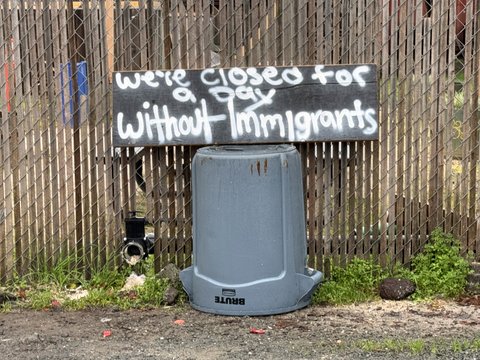
04 Feb A Day Without Immigrants Movement Reveals Impact of White House Threats

This sign let people know that the El Coyote food truck in Sonoma — like many other businesses across the country — was closed Monday as part of a nationwide protest to bring awareness to immigrant labor in the United States in response to the Trump administration’s policies. (Sarah Stierch via Bay City News)
By Ruth Dusseault
Bay City News
No work, no school, no spending — that is the slogan on a social media-driven call for immigrants to boycott participation in society for one day to highlight the contributions they bring to the U.S. economy and culture.
On Monday, in response to the White House plans to deport immigrants, several Bay Area businesses and institutions participated in a national protest called A Day Without Immigrants.
Carlos Solórzano-Cuadra, CEO of the Hispanic Chambers of Commerce of San Francisco said that based on a study they did in 2023, there are approximately 11,000 Hispanic/Latino businesses registered in various Hispanic chambers in the Bay Area.
“We have approximately 65% of them closed today in support of the Day Without Immigrants,” he said. “Also, according to the latest census, we have close to 90,000 Hispanic/Latino owned firms but we have only about 12% of the state’s 750,000 small businesses. Of the 90,000 we estimate approximately 45% are closed today. Preparing for the big march in May!”
The concept began during the first Trump administration when, on Feb. 16, 2017, a national strike of immigrant workers was mounted in protest to Donald Trump’s immigration policies, including building a border wall and potential deportations.
On Monday, under the social media hashtag #undiasinimigrantes, the restaurant Monica’s Livermore posted their support for immigrant workers.
“We will be closed tomorrow Monday 2/3/25 in solidarity with those who feed us. Thank you. While closing our doors even for a day is incredibly costly, we would NOT be able to serve you without immigrants and we MUST stand with them if we hope to stand at all,” the post said.
The City College of San Francisco announced Monday their board of trustees adopted a new resolution reaffirming the college’s commitment to protecting undocumented and LGBTQIA+ students.
The statement from Interim Chancellor Mitchell Bailey said the college aligns with state law and prohibits the college’s police from participating in immigration enforcement; it does not allow immigration enforcement agents to conduct investigations on campus without a judicial warrant and is committed to protecting student data.
“With a new national administration assuming office, federal policy changes have been coming at a rapid pace,” he said. “Undocumented students and LGBTQIA+ students, particularly trans students, are facing uncertain and fearful futures. The college remains committed to ensuring that undocumented and trans students feel welcome and protected on campus, so they can focus on learning and reaching their academic goals.”
On the day after President Trump was elected for a second term, California Attorney General Rob Bonta issued specific guidelines for all state institutions, including courts, K-12 schools, healthcare facilities, college and universities, labor offices, libraries and shelters. The guidelines are available at https://oag.ca.gov/publications#immigration.
They include descriptions of the types of waivers, warrants and subpoenas an immigration officer might present when trying to gain access to institutions or documents. Outside of a federal court warrant, most of them do not automatically grant special permissions to immigration enforcement officers.
Bonta has also addressed community members about their rights as immigrants.
According to a legislative bulletin by the National Immigration Forum, a nonprofit that works on immigration policy, the Trump administration has directed Immigration and Customs Enforcement to meet daily arrest quotas of 1,200 to 1,500 individuals as part of its mass deportation strategy. President Trump’s administration is already preparing the Guantanamo Bay Navy base in Cuba as a detention center for what he described as “the worst criminal illegal aliens.”
Cal State East Bay graduate student Veronica Torres is completing a graduate thesis on identity and power in farm worker communities. Her parents were not immigrants, but she and her mother both grew up in migrant camps.
“My grandmother, she was born on the border, and she has been working as a migrant farm worker since she was seven or eight years old,” Torres said.
The federal Fair Labor Standards Act sets 14 years old as the minimum age for employment and limits the number of hours worked by minors under the age of 16. But, according to the U.S. Department of Labor, youths aged 10 and 11 may hand harvest short season crops outside school hours for up to 8 weeks.
La Cooperativa Campesina de California, a nonprofit that represents farm workers, said in an online fact sheet that farm workers are exempt from many FSLA protections. Over a half a million of all farmworkers in the U.S. reside in California, and approximately 75% are undocumented, their research said.
As part of her research, Torres has engaged children in farm communities in Stanislaus County in art, poetry and music to help them feel a sense of belonging.
“We just did these cultural practices with them to help them share who they are, how to feel like they’re one with this community because these kids are all here for a short amount of time, right?” she said.
“They have to move and migrate to another location,” which she said adds to how difficult it is for them to feel welcomed. “Especially with everything that’s happening with politics. If you look like you are an immigrant, they’re gonna automatically label you as one. Imagine being a child and feeling that.”
“In the Central Valley,” Torres said, “especially in Stanislaus County, there are lot of supporters of white supremacy. People are pretty ignorant, they don’t really understand exactly what migrant farmworkers are, what they have done and are continuing to do for our society.”
Torres has studied the social philosopher Stuart Hall, whose theories describe how dominant social groups build myths in the public imagination.
“What they try to do is to create a folk devil, so then they can put this scare into general society and say these are the people who are creating this problem,” said Torres. “Because of this, they are creating this type of fear, and then they’re able to have more control over the general society.”
Torres hopes the day’s actions will cause the public to take a step back and look at the history of the Latino community and learn how immigrants came here.
“People are not taking the time to do that,” she said. “They’re just listening to the narrative that is being explained to them by these people who have a bigger plan in mind.”
Copyright © 2025 Bay City News, Inc. All rights reserved. Republication, rebroadcast or redistribution without the express written consent of Bay City News, Inc. is prohibited. Bay City News is a 24/7 news service covering the greater Bay Area.






No Comments